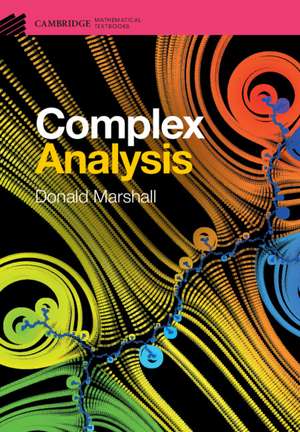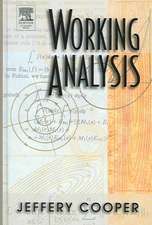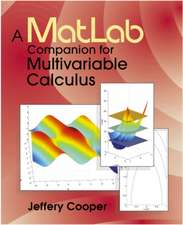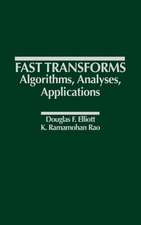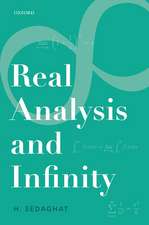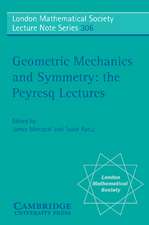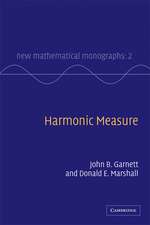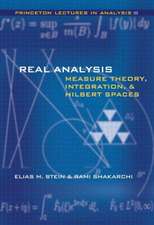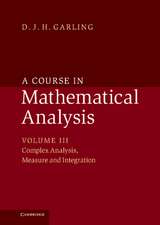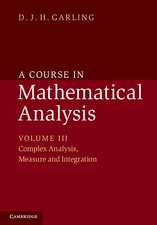Complex Analysis: Cambridge Mathematical Textbooks
Autor Donald E. Marshallen Limba Engleză Hardback – 6 mar 2019
Preț: 474.71 lei
Preț vechi: 533.38 lei
-11% Nou
Puncte Express: 712
Preț estimativ în valută:
90.85€ • 98.65$ • 76.31£
90.85€ • 98.65$ • 76.31£
Carte tipărită la comandă
Livrare economică 22 aprilie-06 mai
Preluare comenzi: 021 569.72.76
Specificații
ISBN-13: 9781107134829
ISBN-10: 110713482X
Pagini: 286
Ilustrații: 68 colour illus.
Dimensiuni: 182 x 261 x 18 mm
Greutate: 0.77 kg
Editura: Cambridge University Press
Colecția Cambridge University Press
Seria Cambridge Mathematical Textbooks
Locul publicării:New York, United States
ISBN-10: 110713482X
Pagini: 286
Ilustrații: 68 colour illus.
Dimensiuni: 182 x 261 x 18 mm
Greutate: 0.77 kg
Editura: Cambridge University Press
Colecția Cambridge University Press
Seria Cambridge Mathematical Textbooks
Locul publicării:New York, United States
Cuprins
Preface; Prerequisites; Part I: 1. Preliminaries; 2. Analytic functions; 3. The maximum principle; 4. Integration and approximation; 5. Cauchy's theorem; 6. Elementary maps; Part II: 7. Harmonic functions; 8. Conformal maps and harmonic functions; 9. Calculus of residues; 10. Normal families; 11. Series and products; Part III: 12. Conformal maps to Jordan regions; 13. The Dirichlet problem; 14. Riemann surfaces; 15. The uniformization theorem; 16. Meromorphic functions on a Riemann surface; Appendix; Bibliography; Index.
Recenzii
'Marshall's book covers the basic topics with crystal clarity in a style that is conversational and concrete, and that guides the student into thinking about these topics the way a working mathematician does, especially one with a geometric or computational bent. Moreover, the book includes many results that are vital to modern function theory and its applications to geometry, dynamics and probability, but that are often omitted from introductory texts. I wish I had first learned the subject from this book, and I am delighted that my students can do so.' Christopher Bishop, State University of New York at Stony Brook
'This is an original and most welcomed new graduate text in complex analysis. Assuming only undergraduate real analysis and following the power series approach, it quickly and elegantly develops the basic theory through Cauchy's theorem for cycles, normal families, the Riemann mapping theorem, and the Weierstrass and Mittag-Leffler theorems. Unique aspects of the book include its many short, clever, and clear proofs of familiar results, the author's computational point of view about conformal mappings, a concise proof of the uniformization theorem from first principles (using the dipole Green's function for the parabolic case), and an excellent selection of exercises, some very thought provoking but having easy proofs.' John Garnett, University of California, Los Angeles
'There are essentially three points of view from which to begin the study of complex analysis, due principally to Cauchy, Weierstrass, and Riemann. These approaches emphasize integral formulas, power series and conformal mapping, respectively. Marshall has chosen to initially adopt the approach of Weierstrass and to emphasize at the outset the notion of a power series. From that point of view, many of the central ideas and theorems of complex analysis arise early in a rather natural way and are quite suggestive of what is true in a much wider context. One of the features of this book that distinguishes it from other texts is its emphasis on conformal mapping, culminating in a beautiful exposition of the Uniformization theorem for simply connected Riemann surfaces. From the outset, the exposition is placed in an historical context, is clear and concise throughout, and includes many new and interesting exercises.' James Brennan, University of Kentucky
'Written by a skillful teacher and grand master of complex analysis, this complex analysis graduate level textbook stands out from other texts through the clarity and elegance of the arguments, the efficiency of the presentation, and the selection of advanced topics. Each of the 16 chapters ends with a carefully selected set of exercises ranging from routine to challenging, making it an excellent textbook and ideal for a first-year graduate course. Marshall's choice of beginning with power series (following Weierstrass) has the advantage of a very fast and direct approach to some of the highlights of the theory. The connection to Cauchy's integral calculus, which is the starting point of most texts, is then made through partial fractions and Runge's theorem. This makes the book an invaluable addition to the complex analysis literature.' Steffen Rohde, University of Washington
'This is an original and most welcomed new graduate text in complex analysis. Assuming only undergraduate real analysis and following the power series approach, it quickly and elegantly develops the basic theory through Cauchy's theorem for cycles, normal families, the Riemann mapping theorem, and the Weierstrass and Mittag-Leffler theorems. Unique aspects of the book include its many short, clever, and clear proofs of familiar results, the author's computational point of view about conformal mappings, a concise proof of the uniformization theorem from first principles (using the dipole Green's function for the parabolic case), and an excellent selection of exercises, some very thought provoking but having easy proofs.' John Garnett, University of California, Los Angeles
'There are essentially three points of view from which to begin the study of complex analysis, due principally to Cauchy, Weierstrass, and Riemann. These approaches emphasize integral formulas, power series and conformal mapping, respectively. Marshall has chosen to initially adopt the approach of Weierstrass and to emphasize at the outset the notion of a power series. From that point of view, many of the central ideas and theorems of complex analysis arise early in a rather natural way and are quite suggestive of what is true in a much wider context. One of the features of this book that distinguishes it from other texts is its emphasis on conformal mapping, culminating in a beautiful exposition of the Uniformization theorem for simply connected Riemann surfaces. From the outset, the exposition is placed in an historical context, is clear and concise throughout, and includes many new and interesting exercises.' James Brennan, University of Kentucky
'Written by a skillful teacher and grand master of complex analysis, this complex analysis graduate level textbook stands out from other texts through the clarity and elegance of the arguments, the efficiency of the presentation, and the selection of advanced topics. Each of the 16 chapters ends with a carefully selected set of exercises ranging from routine to challenging, making it an excellent textbook and ideal for a first-year graduate course. Marshall's choice of beginning with power series (following Weierstrass) has the advantage of a very fast and direct approach to some of the highlights of the theory. The connection to Cauchy's integral calculus, which is the starting point of most texts, is then made through partial fractions and Runge's theorem. This makes the book an invaluable addition to the complex analysis literature.' Steffen Rohde, University of Washington
Notă biografică
Descriere
This user-friendly textbook follows Weierstrass' approach to offer a self-contained introduction to complex analysis.
